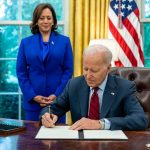The Biden administration continues its trend of handing out taxpayers’ money as though it’s candy, with the latest bonanza totaling over $2 billion aimed at Black and other minority farmers. This announcement, made amid rising food prices and inflation concerns, brings a new level of eyebrow-raising enthusiasm for spending that doesn’t guarantee any tangible returns. Over 23,000 farmers have been granted payments between $10,000 and $500,000, while another 20,000 aspiring farmers saw smaller amounts that couldn’t even cover a decent set of farm tools. This latest round of government largesse has mostly benefitted farmers in the southern states of Mississippi and Alabama – precisely what the nation needs right now, a fresh infusion of bureaucratic cash flow.
Dusting off a well-worn excuse, USDA Secretary Tom Vilsack claimed the payments were an acknowledgment rather than compensation. Apparently, acknowledging past injustices is the new fiscal strategy for an administration that seems more interested in symbolic acts than effective remedies. One could almost hear the clinking of coffee cups in the USDA offices, where the official remedy for decades of discriminatory lending practices is shoehorning money into the pockets of a select few while still ignoring those who got left behind.
Biden administration announces $2 billion in payments to minority farmers over USDA discrimination
https://t.co/UV5NETcycH pic.twitter.com/Ih9ydNF8cd— The Washington Times (@WashTimes) August 1, 2024
The National Black Farmers Association’s president, John Boyd Jr., didn’t hesitate to point out the limitations of the aid. His metaphor comparing the assistance to a flimsy bandage on an open-heart surgery wound speaks volumes about the modest effectiveness of the funds. As the quest for more tangible reparations continues, there’s a question on the tip of many tongues: Isn’t this just a short-term fix that fails to address the real systemic issues most minority farmers face? Boyd himself is still entrenched in a federal lawsuit seeking 120% debt relief for Black farmers—a fight that had significant backing until it met resistance from white farmers claiming exclusionary practices were violating their rights. Anyone surprised this dust-up is delaying real change?
Even with the Congress’s attempt to broaden aid eligibility due to a potential courtroom fiasco, the new allocation of funds still seems a tad uncoordinated. It begs the question: when will politicians truly commit to a strategic, long-term plan that genuinely offers equality rather than mere token gestures? Even with $3.1 billion on the table, it would appear most are left staring into the abyss that is the USDA’s latest spending spree.
The accounts of farmers like Wardell Carter paint a vivid picture of persistence against incompetence. His family, having labored on 85 acres of land since 1939 without even a sniff of a USDA loan application, serves as a stark reminder of decades of bureaucratic neglect. Instead of tractors, they relied on plowing with horses, showcasing both resilience and the stark reality of what restrictive lending practices can do. With interest rates that could give anyone a heart attack, the disparity in support is painfully evident. Yet instead of focusing on how to fix these issues proactively, the focus shifts toward band-aid financial assistance.
In a world where farmers ought to be hailed as heroes of sustainability and hard work, this latest episode displays how far off course the system is. While some individuals benefit from direct payments, the broader community continues to grapple with substantial challenges. Without a solid plan that not only seeks to compensate for past hardships but also fortifies the farmer’s ability to survive moving forward, the cycle of dependency persists. It’s not just a call for help; it’s a loud siren sounding for a more equitable farming future that doesn’t require navigating a jungle of red tape and exclusion.




